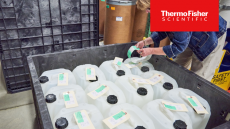Mallinckrodt inks licensing agreement for commercialization of cancer preventative drug

Mallinckrodt Pharma paid a $5m licensing fee to Cancer Prevention Pharmaceuticals (CPP) giving Mallinckrodt exclusive commercialization rights in North America to CPP’s lead drug candidate CPP-IX/sul.
Christine Brannen, Operations Manager of CPP, told us, that if positive results are seen after the Phase III trial, the agreement with Mallinckrodt will allow for the candidate to be filed as a NDA. As per the agreement, Mallinckrodt will be responsible for commercialization, with CPP receiving a 50% share of the profits.
After Mallinckrodt paid $10m in support of a Phase III clinical trial for CPP-IX/sul the company exercised its option to a licensing agreement. The randomized, double-blind, Phase III trial will have results expected in 2019.
Per the terms of the agreement, Mallinckrodt may pay an aggregate of $185m to CPP upon achievement of clinical development and sales milestones. The aggregate payment is subject to a reduction of up to $15m for the payments already given to CPP by Mallinckrodt in advance of this agreement. CPP maintains the global rights to the drug outside of North America.
CPP-IX/sul
CPP-IX/sul is in late-stage clinical development for the treatment of Familial Adenomatous Polyposis (FAP). The drug candidate is a combination of CPP-IX (Elfornithine) and Sul, or sulindac, a non-steroidal anti-inflammatory drug (NSAID), according to Brannen.
“This combination drug targets the polyamine/inflammation pathways, and by interrupting these pathways the drug helps prevent uncontrolled cell growth and polyposis,” said Brannen.
She continued, “Both drugs counteract the effects of chronic inflammation, which promotes tumor development and progression. Preclinical studies using genetically modified mouse models of familial adenomatous polyposis (FAP) were integral to the development of this combination therapy.”
According to Brannen, CPP-IX/sul will be one of the first drugs to be used for cancer prevention and will be beneficial in the development of other preventative drugs. “Most treatments for cancer are still terribly harmful to the patient, extremely expensive, and for many patients ineffective. So being able to prevent cancer with safe and effective pharmacoprevention approaches would be of tremendous benefit to patients at high risk for cancer in terms of quality of life, and to the healthcare system in terms of costs,” said Brannen.
FAP is a genetic disease that is characterized by the cancer of the large intestine. The current treatment plan can be devastating. The progressive removal of the colon and rectum, and additional surgery through the patient’s life is one of the only options. Currently, there is no approved treatment of FAP. The disease occurs in 1 in 10,000 people.
Brannen told us that the founders of CPP were researchers at University of Arizona, a leading research university into the polyamine pathway. The research into CPP-IX/sul and its success in a Phase II clinical trial formed CPP.
The US Food and Drug Administration granted Fast Track designation to CPP-IX/Sul last year, aiming to streamline the drug and its commercialization.



















